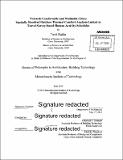| dc.contributor.advisor | Christoph F. Reinhart. | en_US |
| dc.contributor.author | Rakha, Tarek | en_US |
| dc.contributor.other | Massachusetts Institute of Technology. Department of Architecture. | en_US |
| dc.date.accessioned | 2015-10-14T15:02:00Z | |
| dc.date.available | 2015-10-14T15:02:00Z | |
| dc.date.copyright | 2015 | en_US |
| dc.date.issued | 2015 | en_US |
| dc.identifier.uri | http://hdl.handle.net/1721.1/99264 | |
| dc.description | Thesis: Ph. D. in Building Technology, Massachusetts Institute of Technology, Department of Architecture, 2015. | en_US |
| dc.description | Cataloged from PDF version of thesis. | en_US |
| dc.description | Includes bibliographical references. | en_US |
| dc.description.abstract | Outdoor thermal comfort can influence human powered mobility choices, namely walking and biking. As more people are living in cities than ever before in human history, the urban environments we erect and populate are unfortunately contributing to phenomena such as climate change, which is negatively affecting urban life. Our understanding and creation of comfortable environments that are conducive to human powered transport can significantly influence carbon emissions, energy efficiency, and human health, as well as have considerable economic and time saving impacts. With the continuous integration of computer-based decision support systems in design processes, there is a need for developing simulation frameworks that aid architects, urban designers and planners in making informed sustainable design decisions. The focus of this work, therefore, is the development of computer tools and workflows that promote the design of walkable and bikeable cities through comfortable outdoor spaces. This dissertation presents firstly, a simulation methodology, verified through a validation experiment conducted on the MIT campus, for spatially and temporally resolved Mean Radiant Temperature (MRT) simulation and consequent outdoor thermal comfort assessment. Secondly, Building Performance Simulation (BPS) occupancy and trip schedules generation through data clustering techniques applied to activity-based travel surveys. An office modeling case study is presented through extracted occupancy scenarios, to compare simulation accuracy against current practice standards. Finally, an assimilation of both workflows is presented to generate "Trip Comfort" metrics for human powered mobility assessment, in the context of existing or newly designed urban structures. | en_US |
| dc.description.statementofresponsibility | by Tarek Rakha. | en_US |
| dc.format.extent | 106 pages | en_US |
| dc.language.iso | eng | en_US |
| dc.publisher | Massachusetts Institute of Technology | en_US |
| dc.rights | M.I.T. theses are protected by copyright. They may be viewed from this source for any purpose, but reproduction or distribution in any format is prohibited without written permission. See provided URL for inquiries about permission. | en_US |
| dc.rights.uri | http://dspace.mit.edu/handle/1721.1/7582 | en_US |
| dc.subject | Architecture. | en_US |
| dc.title | Towards comfortable and walkable cities : spatially resolved outdoor thermal comfort analysis linked to travel survey-based human activity schedules | en_US |
| dc.type | Thesis | en_US |
| dc.description.degree | Ph. D. in Building Technology | en_US |
| dc.contributor.department | Massachusetts Institute of Technology. Department of Architecture | |
| dc.identifier.oclc | 922641182 | en_US |
